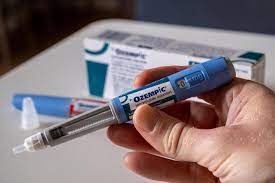An analysis of health insurance claims released on Tuesday revealed that most people using GLP-1 medications—about 58%—discontinued their treatment within 12 weeks. This falls short of a critical benchmark in the weight-loss treatment timeline, as professional organizations recommend reassessing the effectiveness of the treatment after this period.
Users of these medications begin with a low dose, gradually increasing it until they reach a targeted dose. However, the analysis shows that over 30% of people dropped out after just four weeks of treatment, before reaching the targeted dose.
The findings are based on pharmacy and medical claims data for approximately 170,000 people with Blue Cross Blue Shield insurance who were prescribed GLP-1 medications approved for weight management between 2014 and 2023.
“These are long-term medications to treat a chronic disease,” said Dr. Disha Narang, an endocrinologist and director of obesity medicine at Endeavor Health in Chicago, who was not involved in the new research. “This is absolutely a marathon, not a sprint. When treated as a sprint, patients are likely to discontinue the medication much faster.”
Experts suggest that impatience with results is one reason patients might stop treatment. According to a new KFF poll, only about two-thirds of adults who have used injectable weight-loss drugs felt they were effective. Those who discontinued the medications were significantly less optimistic about their benefits: only about half of former users believed the drugs were effective, compared to nearly three-quarters of current users.
Side effects such as nausea, diarrhea, vomiting, and constipation—common early on—may also deter people. Data from the longest clinical trial of Wegovy indicated that 17% of participants stopped due to side effects.
However, experts say many deterrents can be managed with proper counseling from a healthcare provider.
“If you don’t have frequent interactions, it’s hard to manage side effects, expectations, and improvements in other metabolic conditions,” said Dr. Jody Dushay, an endocrinologist at Beth Israel Deaconess Medical Center and assistant professor of medicine at Harvard Medical School, who was not involved in the research.
Each person responds differently to treatment and assesses the balance of costs and benefits uniquely.
“There’s no one-size-fits-all solution. Physicians and patients need to review all data together to make a treatment decision,” Dushay added.
Findings from the Blue Cross Blue Shield data emphasize the crucial role providers play in helping patients adhere to their GLP-1 treatment plans.
People who met with their providers less frequently—and those living in underserved regions with broader health inequities—were more likely to discontinue treatment sooner. Each additional follow-up visit increased a patient’s likelihood of staying on the treatment by 60%, said Dr. Razia Hashmi, vice president of clinical affairs for the Blue Cross Blue Shield Association.
Most prescriptions came from primary care physicians, but patients prescribed GLP-1s by endocrinologists or weight management specialists were more likely to continue treatment for at least 12 weeks.
“Wraparound support services make a significant difference—whether it’s lifestyle support, nutrition, diet, or side effect management,” Hashmi said. “Health equity matters. Social determinants like transportation, access to food, and socioeconomic status also play a role.”
Cost can be a prohibitive factor for these medications—a month’s supply of GLP-1 medications can cost about $1,000. However, the analysis included only people with insurance plans that covered weight-loss medication prescriptions. Insurance plan copays may have influenced cost considerations, but the individuals in this analysis were not paying out-of-pocket for their treatment.
Using GLP-1 treatments still represents an investment in many ways.
“Whether it’s an employer or an individual patient, understanding the success factors is crucial,” Hashmi said. “We want the investment to pay off.”
Another new report supports the claim that the benefits of GLP-1s extend with long-term, consistent treatment.
A report offering real-world data on GLP-1 efficacy found that users lost an average of 1.4% of their starting body weight after three months, increasing to about 3% after a full year. The analysis by Dandelion Health, a healthcare analytics firm, is based on the electronic health records of nearly 17,000 people prescribed a GLP-1 from 2019 through 2023.
Compared to a group with similar clinical characteristics—matched closely on demographic factors such as age and ethnicity, treatment indicators such as average body mass index and diabetes prevalence, history of treatments like bariatric surgery, and prevalence of related comorbidities—the analysis found that those on GLP-1s lost about twice as much weight.
These injected medications, called GLP-1 agonists, are in high demand due to their effectiveness for weight loss. Clinical trials have shown that some stronger medications like Wegovy and Zepbound can help people lose at least 10% of their starting weight. However, the new report suggests that real-world efficacy may not be as promising as clinical trial data would indicate.
Experts warn that the GLP-1 treatment process can vary for everyone.
“There are under-responders, over-responders, and some who respond as expected to the medication,” Narang said. “Research is ongoing to understand why.”
Dandelion Health’s data showed that the top 10% of responders had results similar to clinical trials, while the bottom 10% saw no weight change or even an increase over time.
Nonetheless, GLP-1 medications may offer benefits beyond weight loss, such as improvements in heart and liver health, which could extend to those who don’t lose as much weight as expected.
“It’s essential not to use the scale as the sole measure of whether to continue the medication,” Dushay said. “Slow but steady progress could justify ongoing treatment. There may be direct benefits from the medication even without significant weight loss, so it’s important to discuss the reasons for using this medication with your doctor.”







